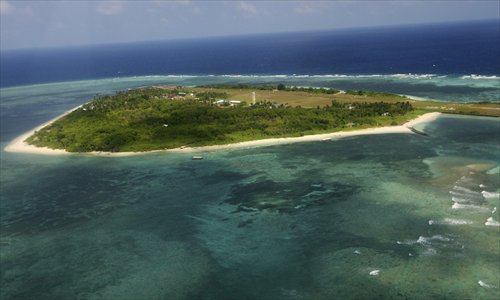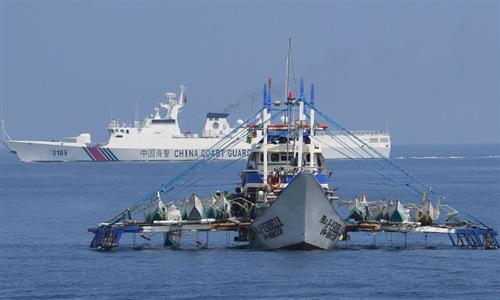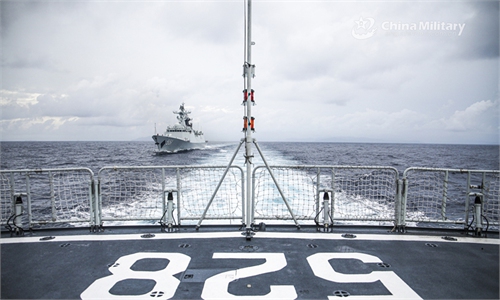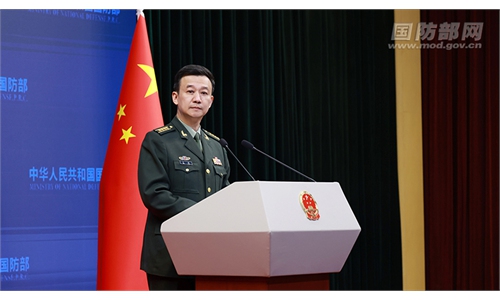Philippines' new coastal station in South China Sea serves to consolidate its illegal control, caters to US interests

An overview of Zhongye Island in the South China Sea Photo: CFP
The Philippines' new coastal station in the South China Sea serves as a base to monitor foreign vessels for the purpose of consolidating its illegal control of China's Zhongye Dao (or Zhongye Island), as well as to cater to the interests of the US in the region, Chinese analysts said on Sunday, saying that Manila's recent proactive acts have gone "off course."
The new three-story facility is furnished with advanced technology including radar, automatic identification, satellite communication and coastal cameras, Reuters reported on Friday, citing the Philippine coast guard.
During a recent visit to the island, Eduardo Ano, the Philippine national security adviser, even accused China of "not adhering to the international order, to the rule of law," the Reuters report said.
A new coast guard station on China's Zhongye Dao in the South China Sea serves to monitor foreign vessels passing by, including China's, as part of Manila's preparations to conduct cognitive warfare against China, Chen Xiangmiao, director of the world navy research center at the National Institute for South China Sea Studies, told the Global Times on Sunday. "The so-called cognitive warfare is to gather information about the opponent and expose them to exert pressure on the opponent through public opinion."
Mao Ning, spokesperson of China's Foreign Ministry, said at a press briefing on October 16 that Zhongye Dao is China's territory. The Philippines has illegally occupied Zhongye Dao, which seriously violates China's sovereignty.
Chen believes the Philippines' act of building a new coast guard station on Zhongye Dao must have been backed by the US, as it serves the overall US Indo-Pacific Partnership for Maritime Domain Awareness, which aims to establish a network or interagency maritime intelligence collection in the Indo-Pacific region through the combination of sea and water, and air and space means.
Regardless of the already mounting tensions in the area, the Philippines recently has been actively inviting countries to beef up defense cooperation in the region. The Philippines and France agreed to commence discussions for a defense agreement that would enable troop visits, according to Bloomberg on Sunday.
The Philippines already has similar agreements with the US and Australia, and it has also agreed to begin negotiations with Japan on such an agreement, media reported.
The first joint sea and air patrols between the Philippines and Australia began on Saturday, according to Anadolu Agency.
By seeking backing from external forces, the Philippines intends to justify its illegal behavior of taking over China's islands in the waters to shift its relatively weak balance of power with China, Chen said but he warned that it will not benefit the Philippines other than by seemingly getting diplomatic resources.
Inviting external forces will only escalate regional tensions and increase the Philippines' cost of maritime operations, and more importantly, it is losing a sound environment to conduct friendly dialogue with China to solve disputes, Chen noted.
More countries which are seeking to assert their own geopolitical interests and contain China's influence in the region are likely to join the Philippines's initiative, Wu Shicun, president of the National Institute for South China Sea Studies, at the International Symposium on Maritime Dispute Settlement and International Law, which was held in Beijing last week.
Additionally, since the beginning of 2023, the Philippines has repeatedly created tensions in the waters off China's Ren'ai Jiao (better known as Ren'ai Reef) of the Nansha Islands. Philippine President Ferdinand Marcos Jr even said that he has taken the initiative to contact Vietnam, Malaysia and other countries, hoping to discuss the possibility of reaching a new code of conduct in the South China Sea excluding China. In this regard, Wu said that the Marcos administration's attempt to start anew will only cause divisions in ASEAN.
"The Philippines has gone off course and is a bit naive," Wu said, adding he predicts that the Philippines is likely to continue its risky behavior for a while.
From what the Philippine government opts to do in the water, its South China Sea policy only serves to cater to part of the national sentiment at home and to the strategic adjustment of the US, rather than serving the national interests of the Philippines itself, Chinese experts noted. "Taking the risk of hurting ties with China is shooting themselves in the foot," Chen said.



